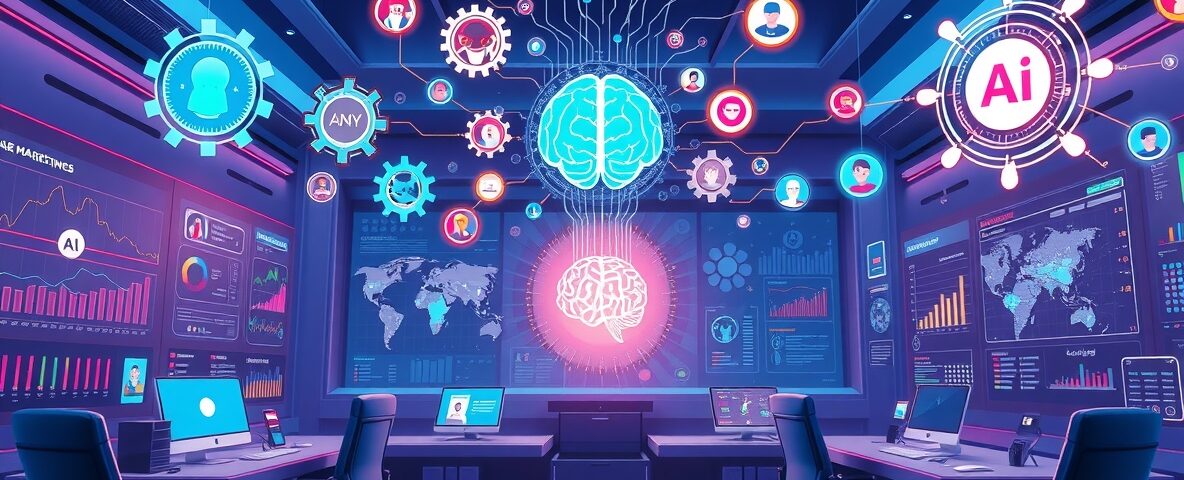
AI is Redefining Marketing: Adapt Now or Fall Behind
September 17, 2025
AI-Driven Marketing: The Ultimate Game Changer for Your Strategy
September 17, 2025Marketing plays a crucial role in the success of any business. In today’s competitive landscape, staying ahead of the curve and adopting innovative strategies to reach target audiences effectively is essential. One such innovation that has revolutionized marketing practices is Artificial Intelligence (AI). AI tools have transformed how businesses approach marketing by offering data-driven insights, automation capabilities, and enhanced customer experiences. In this blog post, we will explore the power of AI tools and how they can become your secret weapon for marketing success.

AI Tools for Market Research
Market research forms the foundation of any successful marketing campaign. AI-powered tools have made gathering and analyzing market data more efficient and accurate. These tools can collect vast amounts of data from various sources and provide valuable insights into consumer behavior, preferences, and market trends in real-time. By harnessing the power of AI, businesses can make informed decisions, develop targeted marketing strategies, and gain a competitive edge. Let’s dive deeper into the specific benefits of AI tools for market research.
How AI-powered tools can gather and analyze market data
AI tools utilize advanced algorithms to collect and analyze market data from diverse sources such as social media, online forums, surveys, and customer feedback. These tools can process unstructured data, extract relevant information, and identify patterns and trends humans might miss. Businesses can save time and resources by automating the data collection and analysis process while gaining a comprehensive understanding of their target market.
Real-time monitoring and analysis of consumer behavior
AI tools enable businesses to monitor consumer behavior in real-time. For example, social media listening tools use AI algorithms to track brand mentions, sentiment analysis, and customer conversations. By closely monitoring these insights, businesses can identify emerging trends, measure the effectiveness of their marketing campaigns, and promptly respond to customer feedback. This real-time analysis allows for agile decision-making and swift adjustments to marketing strategies, resulting in better engagement and increased brand loyalty.
Predictive analytics for market trends and customer preferences
Predictive analytics is a powerful AI tool that can forecast future market trends and customer preferences. By analyzing historical data and identifying patterns, businesses can anticipate market shifts, optimize product development, and tailor marketing messages to meet evolving customer needs. For instance, a retail company can use predictive analytics to predict which products will be in high demand during certain seasons or events. This enables them to plan their inventory and marketing campaigns accordingly.
Case studies showcasing the effectiveness of AI in market research
Example 1: XYZ Company, a leading e-commerce platform, implemented an AI-powered market research tool to gain insights into their target audience. They discovered a growing demand for sustainable and eco-friendly products by analyzing social media conversations and customer reviews. Armed with this information, XYZ Company launched a marketing campaign highlighting their environmentally conscious products, resulting in a 20% increase in sales and a boost in brand reputation.
Example 2: ABC Corporation, a software development company, used AI tools to analyze market trends and competitor data. They identified a gap in the market for a specific software solution and quickly developed a product to fill that void. By leveraging AI-driven market research, ABC Corporation gained a competitive advantage, attracting new customers and expanding its market share.

AI Tools for Content Creation and Optimization
Creating high-quality and engaging content is a cornerstone of successful marketing strategies. AI tools offer a range of capabilities that can streamline and enhance the content creation process. From generating ideas to optimizing for search engines, AI-powered tools can save time, improve content quality, and drive organic traffic. Let’s explore how AI tools can become your secret weapon for content creation and optimization.
Automating content generation with natural language processing
AI-powered natural language processing (NLP) tools have significantly advanced in generating human-like content. These tools can automatically analyze vast amounts of text data, understand context, and develop coherent and relevant content. For instance, a travel website can use an AI-powered tool to generate informative and engaging destination guides based on data from travel blogs, reviews, and other online sources. Businesses can create a consistent stream of high-quality content by automating content generation without compromising creativity.
AI-based tools for content ideation and topic generation
Creating fresh content ideas and topics can be challenging, especially in industries with fierce competition. AI tools can help businesses overcome this hurdle by providing data-driven insights and generating topic suggestions. For example, an AI tool can analyze search trends, social media conversations, and competitor content to identify untapped topics and keywords with high search volumes. With these insights, businesses can develop content that resonates with their target audience and stands out.
Enhancing content quality with AI-driven grammar and style suggestions
Grammar and style are crucial elements of well-crafted content. AI-powered tools can analyze written content, detect grammar errors, suggest improvements, and recommend writing style. This can be particularly useful for non-native English speakers or businesses with limited resources for hiring professional editors. AI-driven grammar and style suggestions ensure that content is error-free, engaging, and aligned with the brand’s tone and voice.
Optimizing content for search engines using AI-powered SEO tools
Search engine optimization (SEO) is vital for increasing organic traffic and visibility. AI-powered SEO tools leverage machine learning algorithms to analyze search engine ranking factors, identify keyword opportunities, and optimize content accordingly. These tools can recommend keyword placement, meta tags, image optimization, and internal linking, ultimately helping businesses improve search engine rankings and attract more organic traffic.

AI Tools for Social Media Marketing
Social media platforms have become integral to marketing strategies, allowing businesses to connect with their target audience personally. AI tools can significantly enhance social media marketing efforts by automating routine tasks, analyzing audience sentiments, personalizing marketing campaigns, and improving customer engagement. Let’s explore how AI tools can be your secret weapon for social media marketing success.
Automating social media scheduling and posting
Managing multiple social media accounts and consistently posting engaging content can be time-consuming. AI-powered social media tools can automate the scheduling and posting, allowing businesses to plan and manage their social media presence more efficiently. These tools can analyze audience engagement data, identify optimal posting times, and publish content accordingly. Automating this process allows businesses to save time and ensure a consistent and timely presence on social media platforms.
AI-driven sentiment analysis for understanding audience reactions
Understanding how your audience perceives your brand is essential for effective social media marketing. AI tools can analyze social media conversations, comments, and reviews to gauge audience sentiment toward your brand or specific campaigns. Sentiment analysis algorithms can identify positive, negative, or neutral sentiments and provide valuable insights into customer opinions and preferences. This information allows businesses to tailor their marketing messages and strategies to align with audience sentiments and priorities, improving overall engagement and brand perception.
Personalized marketing campaigns using AI-powered customer segmentation
Personalization is critical to capturing the attention of today’s consumers. AI tools can segment audiences based on various parameters such as demographics, behavior, interests, and past interactions. Businesses can create personalized marketing campaigns that resonate with specific customer segments by analyzing this data. For example, an e-commerce company can use AI tools to identify customers interested in a particular product category and deliver targeted promotions or recommendations based on their preferences. Personalized marketing campaigns increase engagement, foster customer loyalty, and drive conversions.
Chatbots and virtual assistants for improving customer engagement
Chatbots and AI-powered virtual assistants have become increasingly popular for improving customer engagement on social media platforms. These AI-driven tools can respond instantly to customer queries, offer personalized recommendations, and guide users through buying. By incorporating chatbots into their social media strategy, businesses can provide 24/7 customer support, streamline customer interactions, and enhance the overall user experience. Chatbots save time and resources, improve customer satisfaction, and build brand loyalty.

AI Tools for Email Marketing
Email marketing remains a highly effective channel for reaching and engaging with customers. AI tools can automate various aspects of email marketing, such as campaign creation, customization, and performance analysis. These tools leverage AI algorithms to optimize send times, subject lines, and email content, resulting in higher open rates, click-through rates, and conversions. Let’s explore how AI tools can be your secret weapon for successful email marketing.
Automated email campaign creation and customization
AI tools can streamline the email campaign creation process by automating repetitive tasks. These tools can generate personalized email templates, populate them with customer-specific content, and automatically schedule and send emails based on predefined triggers or customer behavior. For instance, an AI tool can send personalized product recommendations to customers who have shown interest in a specific product category. By automating email campaign creation and customization, businesses can save time, maintain consistency, and deliver tailored content to their audience.
AI algorithms for predicting optimal send times and subject lines
The success of an email campaign heavily depends on the timing of its delivery and the effectiveness of its subject line. AI tools can analyze historical data and customer behavior patterns to predict the optimal send times for each recipient. Additionally, AI algorithms can analyze subject lines, identify elements that resonate with specific customer segments, and provide recommendations for improving subject line performance. By leveraging AI-powered insights, businesses can increase the likelihood of their emails being opened and read, ultimately driving higher engagement and conversions.
Personalized email content based on customer behavior and preferences
AI tools can analyze customer behavior, preferences, and past interactions to deliver highly personalized email content. These tools can dynamically populate email templates with product recommendations, special offers, or relevant content based on each recipient’s browsing history, purchase history, or demographic information. Businesses can create a more tailored and relevant customer experience by personalizing email content, resulting in higher engagement and conversion rates.
Analyzing email campaign performance and making data-driven improvements
AI tools can provide comprehensive analytics and insights into email campaign performance. These tools can track open rates, click-through rates, conversions, and unsubscribe rates. By analyzing this data, businesses can identify patterns, trends, and areas for improvement. AI algorithms can provide actionable recommendations to enhance future email campaigns, such as adjusting send times, modifying subject lines, or optimizing email content. By leveraging AI-driven insights, businesses can continually refine their email marketing strategies and achieve better results.

AI Tools for Advertising and Conversion Optimization
Effective advertising and conversion optimization are vital for maximizing marketing ROI. AI-powered tools offer advanced capabilities to target the right audience, automate advertising processes, and optimize conversions. By leveraging AI in advertising, businesses can enhance their ad targeting, bidding strategies, and overall campaign performance. Let’s explore how AI tools can be your secret advertising and conversion optimization weapon.
Targeted advertising using AI-powered audience segmentation
AI tools can segment audiences based on various parameters, including demographics, interests, behaviors, and purchase history. Businesses can deliver highly targeted advertisements to specific customer segments by leveraging these audience segmentation capabilities. For example, an e-commerce company selling outdoor gear can target outdoor enthusiasts with ads for hiking equipment and camping gear. By targeting the right audience with relevant ads, businesses can increase ad conversion rates and optimize advertising spend.
Programmatic advertising and real-time bidding
AI-powered programmatic advertising platforms have revolutionized how businesses buy and sell ad inventory. These platforms use algorithms to automate buying and placing ads across multiple channels and websites. Real-time bidding allows advertisers to bid on ad impressions in real-time, optimizing their bids based on the likelihood of conversion. AI algorithms analyze user behavior, contextual data, and other factors to determine the optimal bid amount and ad placement, ultimately maximizing the effectiveness of advertising campaigns.
Conversion rate optimization with AI-driven A/B testing
A/B testing is a common practice in marketing to optimize conversion rates. AI tools can enhance this process by automating A/B testing and analyzing the results using machine learning algorithms. AI-driven A/B testing can efficiently test multiple variations of ad creatives, landing pages, or call-to-action buttons. The algorithms can then identify the most effective elements and combinations to improve conversion rates. By leveraging AI-driven A/B testing, businesses can make data-driven decisions, refine their marketing assets, and increase their overall conversion rates.
Dynamic pricing and product recommendations based on AI algorithms
AI-powered tools can analyze customer behavior, purchasing patterns, and market conditions to offer dynamic pricing and personalized product recommendations. Dynamic pricing algorithms can adjust prices based on demand, competitor pricing, and customer preferences. Customized product recommendation engines can analyze customer data to suggest relevant products that align with their interests and browsing history. Businesses can use AI algorithms for dynamic pricing and product recommendations to enhance customer experience, drive conversions, and increase revenue.

AI Tools for Customer Relationship Management (CRM)
Maintaining strong customer relationships is crucial for long-term business success. AI-powered CRM tools can automate and optimize various aspects of customer relationship management, from customer support to lead nurturing and retention. By leveraging AI in CRM, businesses can improve customer satisfaction, increase sales efficiency, and foster long-term loyalty. Let’s explore how AI tools can become your secret weapon for customer relationship management.
AI-driven chatbots for 24/7 customer support
Chatbots have become increasingly sophisticated thanks to AI technologies such as natural language processing and machine learning. AI-powered chatbots can respond instantly to customer queries, guide users through self-service options, and escalate complex issues to human agents when necessary. Chatbots offer 24/7 customer support, ensuring timely and consistent assistance, improving customer satisfaction, and reducing support costs. Additionally, chatbots can learn from customer interactions, enabling businesses to continuously improve their customer support processes and knowledge bases.
Predictive lead scoring for identifying potential customers
AI tools can analyze vast amounts of customer data to identify potential leads and prioritize them based on their conversion likelihood. Predictive lead scoring algorithms consider various factors, such as demographic information, past interactions, and purchasing behavior, to assign a lead score. This helps sales teams focus on high-potential leads, increasing efficiency and conversion rates. By leveraging predictive lead scoring, businesses can optimize their sales processes, allocate resources effectively, and close deals more efficiently.
Automated sales funnel tracking and lead nurturing
Tracking the progress of leads through the sales funnel is essential for optimizing conversion rates. AI tools can automate tracking by analyzing customer interactions, purchase history, and engagement levels. This gives businesses real-time insights into where each lead is in the sales funnel and allows for timely and personalized follow-ups. AI-powered lead nurturing campaigns can automatically deliver tailored content, offers, and reminders to move leads closer to conversion. Businesses can streamline their sales processes, improve lead conversion rates, and drive revenue growth by automating sales funnel tracking and lead nurturing.
Using AI to enhance customer retention and loyalty
AI tools can play a significant role in customer retention and loyalty initiatives. For example, AI algorithms can analyze customer behavior and patterns to predict churn risk, allowing businesses to intervene with proactive retention strategies. AI-powered recommendation engines can suggest personalized upsells, cross-sells, or loyalty rewards based on each customer’s preferences and purchase history. By leveraging AI to enhance customer retention and loyalty, businesses can increase lifetime value, strengthen relationships, and foster brand advocacy.
AI tools have emerged as powerful secret weapons for marketing success. From market research to content creation, social media marketing, email marketing, advertising, conversion optimization, and customer relationship management, AI tools offer a range of capabilities to streamline processes, improve efficiency, and enhance customer experiences. By harnessing the power of AI, businesses can gain valuable insights, automate routine tasks, deliver personalized content, and make data-driven decisions. Embracing AI tools in marketing strategies can provide a competitive edge and drive significant business growth in today’s fast-paced digital landscape.


